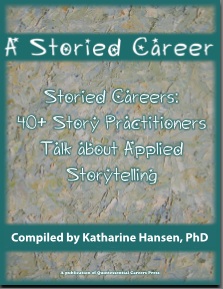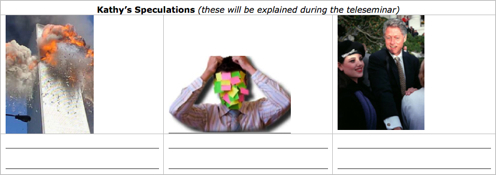My friend, “Jane Bergen” (a pseudonym) has been toying for a while with telling the story of the massive stroke she suffered last year. Even though Jane has had a remarkable recovery, she was afraid of coming off whiney or victim-y.
My gut reaction was that baby boomers need to hear Jane’s story. We are the generation that refuses to get old. The thought of a crippling affliction like a stroke or cancer unhinges us. I am am particularly terrified of anything — like Alzheimer’s — that would impair my cognitive abilities. We need to hear that the ailments and medical traumas we associate with old age can be overcome.
And a week ago Jane sent me a story that is anything but whiney and victim-y. It’s a positive message of hope, recovery, and creating a different — but in some ways, better — life following a health calamity.
Back in May 2008, like the subject herself, I took some heat for blogging about Jill Bolte Taylor, whose TED Talk and book titled A Stroke of Insight, have been criticized for promulgating “bad science.” The controversy came in when Taylor claimed to have experienced an amazing burst of creativity in one side of her brain as a result of her stroke. Putting science aside, Taylor’s message of amazing recovery is very much like Jane’s.
Here’s Jane’s story, one that baby boomers like me need to hear:
Whether Disabled or Not, Keep Your Spirits Up
By Jane Bergen
I am a person to be envied. If you were me, you would be envied too. Why envied? Well:
- I always get the best parking space, right by the door.
- I lost 30 pounds and shop the lower sizes of the racks, wearing clothes that haven’t fit me for 20 years.
- I take nothing for granted and am fueled by gratitude.
- I have no stress and sleep like a baby.
- I am finally “good enough” and have a great self-concept because it is so easy to outdo people’s low estimation of my capabilities.
- I am rich in friends. I have an organized address book that lists 350 people, 30 of whom check in on me regularly.
- People show me their “kind” side every day.
- I have a great marriage. Indeed, husband and friends say they would love me even if I stayed as I was.
- Instead of coming to a funeral, everyone I know has contacted me personally in the last year.
- I am constantly challenged, told how to do it, and it works! I see achievement every day.
Surprise! I am Disabled!
I’m a former recruiter and career coach who became permanently disabled with an out-of-the-blue cerebellar stroke last year.
Nothing I did caused this. I had a birth defect, a darn AVM — tangled plumbing in my head [pictured], that got old and leaked, causing the stroke. Being a disabled person was to be part of my life.
So I could be pissy about this or I could see the bright side. What I’ve learned is that life is 10 percent what happens to you and 90 percent what you do with it; that people have busy lives and forget you if you forget them; and that everyone has problems, so why are yours so special? Sincerely being interested in others makes people interested in you. They call and you feel good that you have been of service.
People tend to be nice to you, but some of their behavior may be out of fear. They are afraid of doing the wrong thing or becoming sick like you. Your job is to educate them. It is not your fault you are like this. It is not their fault they don’t know what to do. I explain a deal with my friends. True, I talk funny, I acknowledge. If I talk as well as I can for them and they try as hard as they can to understand, we’ve done our best. No shame! I’ll email or write something down to get my point across. So I don’t stop trying to deal with normal people: they are so affirming when I do the smallest thing because they expect me to be ashamed, blue, and depressed. Well, not! I believe that if you quit trying, you cheat yourself. Be affirmed that your friend cared enough to try to understand, rather than the fact that he or she failed.
Oh yeah, a year ago, they also thought I had cancer, and I might not have the stamina, post-stroke, to endure. I truly thought I was going to die. And I am a baby boomer who turned against the church years ago, having been raised fundamentalist Southern Methodist and having gone to church every week of my life until age 20-something. So I hated the hypocrisy of the church, which talks of God, but was created by Man with all his foibles.
So when I thought I was going to die, well, then I realized that money really doesn’t matter much. I could have won the lottery and it would not have changed a thing. You think about the plight of your fellow human, the suffering that is life, and wonder if you have the stamina to die, and then what? Buddhism promises to provide panaceas for fear of death. But Jesus and all the dogma I was brought up with? What does that have to do with my current world? His message seemed to be “give all your cares to me, and I will suffer for you.” I really wasn’t looking for a scapegoat. My friends, doctors, and husband all wanted me to get better, they expected me to overcome and be happy. Could Jesus help me with that? You think about stuff like this when you think your goose is cooked.
I realized my first life had been all about the usual trials I see my friends going through – seeking food and shelter, suffering through a job to pay for it, not ever having enough money or time to pay for it, struggling to lose weight, stay sexy and young, keep health intact, raise kids, and trying to meet all obligations. The usual rat race. My first life is gone. I had so much, so many gifts, like speech and walking, but I was not happy. I always desired more.
I woke up the morning of the stroke not able to walk. My vision was blurry, and I talked like a drunk, when I could talk. Swallowing was awkward. I was told I had a one in 10 chance of a full recovery (and God willing, I will be that one in 10 yet), that strokes take years to recover from, and I had a 50 percent chance of becoming seriously depressed within one year. One in two people who have strokes become depressed because of changes in lifestyle (no social life and not working), isolation, and financial ruin.
I decided I could beat my body with exercise and doing what therapy told me to do. But fighting my own head — a 50 percent chance? Dear God, my head has such a good imagination about negative things. I was going to have to improve my spirituality to avoid this depression debacle. Truly, in all cases, depression is worse than stroke.
If you have not had a stroke, you are still a candidate for depression. I have learned that these things will help you avoid this all-to-common malady that doctors are so willing to give your pills to cure (don’t do it — it just masks the cause)
Read Jane’s advice on avoiding depression in the extended entry.
To avoid depression:
- Develop a network of friends – or revitalize the one you have. The worst thing you can do is sit home and think about yourself and your problems. Your job instead is to ask people how they are; show an interest in them, so they will take an interest in you. Give yourself away to others, to the world around you. Open up a Yahoo email account and Facebook account — use the computer to stay involved. Volunteer. Support a cause. Be a gym buddy for a friend and talk him or her into going to the gym with you — on the same day/night every week — you do both you and the other person a favor. You’ll both establish good workout habits.
- Establish an online calendar and address book on Yahoo or Gmail so you can “recruit” people to give you rides, go to events, email/educate them about your condition and activities you can do together. In the early days, I would “ask” -recruit, if you will. I would find a play, a movie or a cooking class I wanted to go and then asked people to go with me. Friends were ecstatic they didn’t have to think of an “appropriate activity” for my disability and by spreading my “recruiting” emails among my 30 best friends, I didn’t wear them out seeing me. I was not a burden because I spread my “asks” around among a large group of people.
- Always have something to look forward to.
- Listen to your body. If it wants to rest, obey it. Slow living is less stressful living.
- Set up a schedule that allows for the extra time is takes to dress, eat, exercise, do your therapy, do computer time, socialize, go to doctor appointments and cook meals, enjoy family time. Replace your work schedule with a daily schedule of things you want to do. It won’t be right the first time. If you don’t get it all done, tweak it and forgive yourself and try again. This advice is particularly appropriate with exercise and therapy and naps. I couldn’t get a balance for the longest time on my need for rest, my need for exercise and a need for socialization and a life. A rough schedule of when you will do what in a day really helps!
- Tend to your spirit. Read philosophy, argue with Rush Limbaugh, surf the Huffington Post, read the bible, the Koran, books on Zen Buddhism. And take Tai Chi (Chinese medicine) for meditation and balance and good networking. Look at both sides of the question with an open mind. You may better understand how God, prayer, and spirit buoy you to take on the next moment’s challenges. And if God isn’t your thing, you might find something to make life have more meaning; keep searching.
- Pray for others. I received prayers from my neighborhood church and from my family’s church, where my Mom still lives. I may have issues with the church, but prayer works. My remarkable recovery is proof.
- Never give yourself the luxury (?) of a negative thought. Remember that two words — “thank you” are the antidote to anger. Your spouse/caretaker/God himself/herself might make you mad, but it is given with a good heart, even if the gift itself made you livid. Say thanks for the good heart. It is amazing how a positive conversation, not steeped in anger, really gets somewhere. Emerson said it well: Now is not the time to think of what you do not have. Think of what you can do with what there is.
There is a spirit in all of us that can do good if is allowed to shine. Never stop asking. Never think something that God made, namely yourself, is half as bad as you think you are. You have to be positive to let the light shine.
Attitude is everything.
Jane Bergen is a pseudonym for a real former recruiter and business owner who lives in the Northwest.








